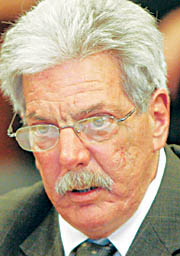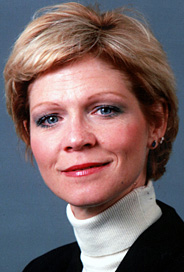Gains asks judge to void order

Prosecutor Paul Gains

Judge Maureen A. Sweeney
YOUNGSTOWN
Mahoning County Prosecutor Paul J. Gains has asked a judge to void her order that overruled his request for outside legal counsel to represent him and the county commissioners in an Ohio Supreme Court public- records case related to the Oakhill purchase.
“This court lacks jurisdiction to veto the commissioners’ requested counsel,” Gains wrote in a Tuesday motion, which asks Mahoning County Common Pleas Court Judge Maureen A. Sweeney to reconsider the matter and allow Gains and the commissioners the outside lawyers of their choice.
In last Thursday’s order, Judge Sweeney overruled a county commissioners’ resolution to hire the Columbus law firm of Vorys, Sater, Seymour and Pease to represent Gains, his assistant prosecutor, Gina Bricker, and the county commissioners on the grounds that the firm’s fees are excessive.
The judge also wrote that the court should decide whether outside lawyers are needed and appoint them if needed and that local lawyers should be hired.
Gains said outside lawyers are needed because he and Bricker are defendants in a mandamus complaint filed with the top court and could be called as witnesses.
The mandamus complaint was filed by Atty. John F. McCaffrey of Cleveland in support of McCaffrey’s public- records request concerning Oakhill Renaissance Place, the former Forum Health Southside Medical Center.
McCaffrey said Gains’ office didn’t completely fulfill his request in accordance with the state’s open-records law, and he is asking the high court to compel Gains to do so.
McCaffrey is a defense lawyer for Cafaro Co. affiliates in a pending criminal case, in which the Cafaro interests and some current and former county officials are charged with conspiring to prevent or delay the move of the county’s Department of Job and Family Services from Cafaro-owned rented quarters to Oakhill.
The criminal case is set for trial before visiting Judge William H. Wolff Jr. on June 6, 2011.
The county’s deadline to respond to McCaffrey’s public-records complaint had been Monday, but the top court issued a stay and said it would set a new deadline if the public- records dispute is returned from mediation.
In his request for Judge Sweeney to reconsider her order, Gains cited Ohio Supreme Court rulings that the choice of, and compensation for, outside lawyers is the commissioners’ prerogative, not that of the common-pleas court.
In an interview late Tuesday afternoon, Judge Sweeney, who is the court’s administrative judge, said she had not yet seen Gains’ motion for reconsideration.
Ohio law says judges “may appoint,” not “shall appoint,” outside counsel upon request of county officials, Judge Sweeney said, calling her order a consensus of the opinions of all five general-division Mahoning County Common Pleas Court judges.
She added that she consulted her four colleagues concerning her order, and they reviewed it before she signed it, and she plans to consult them again on this matter.
The issue in dispute is a public-records request, which Gains routinely gets, Judge Sweeney said, adding that other lawyers in his office may be able to represent him in this dispute. “We need a little bit more” information from Gains, Judge Sweeney said. “We need to know why he has to use that firm.”
Given that all five general-division common-pleas judges removed themselves from the Oak-hill criminal case, Judge Sweeney was asked how she or any of her colleagues could rule on appointment of outside defense lawyers for the Oakhill-related public-records dispute.
If Gains could show the judges that the public-records request goes to the merits of the criminal case, the judges might view the matter differently and might remove themselves from the appointment of counsel for the public-records case as well, she said. “He hasn’t shown that,” she said of Gains.
In Tuesday’s motion, Gains did not ask the Mahoning County Common Pleas Court judges to remove themselves from appointment of outside lawyers for the public-records case.
 43
43
